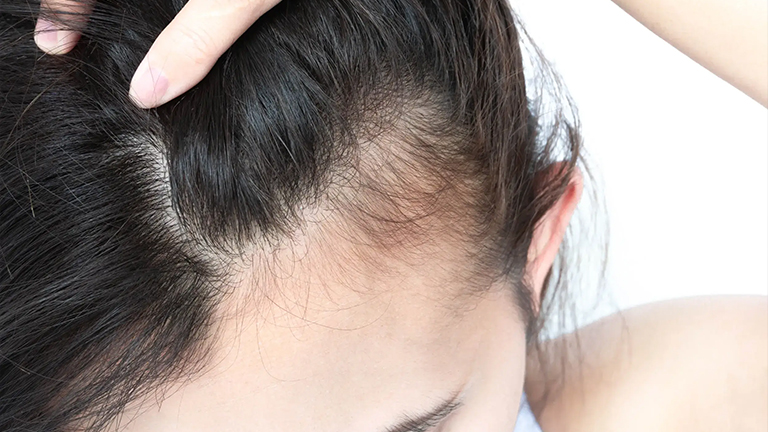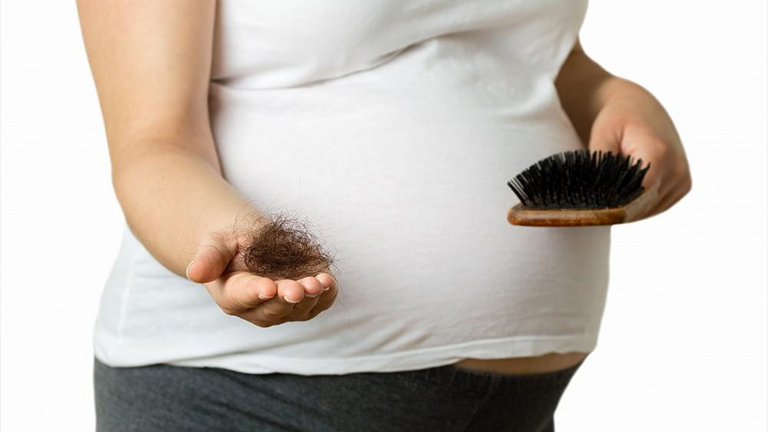Stop Hair Thinning After Pregnancy: Hair thinning after pregnancy, also known as postpartum hair loss, is one of the most common experiences new mothers face. Many women enjoy thick, shiny hair during pregnancy because of hormonal changes that extend the growth phase of hair. However, after childbirth, estrogen and progesterone levels drop, which triggers the hair to shift into the shedding phase. This results in noticeable hair thinning and sometimes alarming hair fall.
While postpartum hair loss is usually temporary, it can cause emotional distress for new mothers who are already adjusting to life with a newborn. Learning how to stop hair thinning after pregnancy involves understanding the causes, adopting healthy habits, and following natural as well as medical remedies.
Why Does Hair Thinning Happen After Pregnancy?
Hair loss after pregnancy is primarily linked to hormonal changes. During pregnancy, estrogen levels remain high, keeping hair in the growth stage. Once the baby is born, estrogen levels rapidly decrease, causing many strands to enter the resting and shedding phase at the same time.
Another reason is the stress and lack of sleep new mothers experience, which can weaken hair follicles. Nutritional deficiencies also play a key role. Many women don’t get enough vitamins and minerals during postpartum recovery, leading to weaker hair strands and slow regrowth.
Additionally, breastfeeding increases nutritional demands, meaning the body prioritises nutrients for milk production, sometimes leaving hair health compromised.
[INSERT_ELEMENTOR id=”5108″]
How Long Does Postpartum Hair Thinning Last?
Typically, postpartum hair loss begins around two to four months after delivery. The shedding can continue for up to six months, with most women seeing improvement by the time their baby turns one year old. For some, hair growth may normalise sooner, while others may need additional support through proper nutrition, supplements, and treatments.
If hair thinning continues beyond 12 months, it may be due to underlying conditions such as thyroid imbalance, anemia, or other health issues. In such cases, consulting a healthcare provider is essential.
Natural Remedies to Stop Hair Thinning After Pregnancy
One of the most effective ways to address hair thinning after pregnancy is through natural remedies. They are safe, gentle, and often provide long-term benefits for hair health.
Aloe Vera for Postpartum Hair Loss
Aloe vera has soothing properties that nourish the scalp and promote regrowth. Applying fresh aloe vera gel directly onto the scalp twice a week helps reduce dryness, strengthens follicles, and minimises shedding.
Coconut Oil for Stronger Hair
Massaging warm coconut oil into the scalp improves blood circulation and prevents breakage. Coconut oil is rich in fatty acids that deeply penetrate hair strands, restoring strength and shine.
Onion Juice for Hair Regrowth
Though strong in smell, onion juice is rich in sulfur, which boosts collagen production and supports faster regrowth. Applying onion juice to the scalp and rinsing after 20 minutes twice a week can reduce thinning.
Green Tea Rinse for Hair Growth
Green tea contains antioxidants that protect hair follicles from damage. Rinsing the scalp with cooled green tea helps stimulate growth and reduce shedding.
Best Diet and Nutrition for Hair Regrowth Postpartum
Diet plays a crucial role in managing how to stop hair thinning after pregnancy. Without the right nutrients, hair follicles weaken and growth slows down.
Protein for Strong Hair
Protein is the building block of hair. Consuming lean meats, eggs, beans, fish, and dairy helps strengthen hair shafts.
Iron for Preventing Hair Loss
Iron deficiency is common in postpartum women. Eating iron-rich foods such as spinach, lentils, red meat, and pumpkin seeds helps prevent anemia, which can worsen hair loss.
Omega-3 Fatty Acids for Hair Shine
Omega-3 fatty acids found in salmon, walnuts, and chia seeds help improve scalp hydration and encourage thicker growth.
Vitamins and Minerals
- Vitamin D: Supports healthy hair follicles.
- Vitamin E: Improves blood circulation in the scalp.
- Zinc: Strengthens hair roots and reduces breakage.
- Biotin: Known as the hair vitamin, biotin is essential for regrowth.
Hydration is equally important. Drinking enough water helps maintain scalp moisture and prevents dryness.
Effective Vitamins and Supplements for Hair Loss After Pregnancy
Even with a healthy diet, supplements may be necessary to restore balance. Popular postpartum supplements include:
- Biotin supplements for stimulating keratin production.
- Prenatal vitamins continued after delivery to maintain essential nutrients.
- Omega-3 capsules for healthy scalp and hair growth.
- Iron supplements if diagnosed with anemia.
It is best to consult a doctor before starting supplements to ensure they are safe for breastfeeding mothers.
Best Hair Care Routine to Prevent Postpartum Hair Thinning
Adopting a gentle hair care routine is essential to reduce postpartum hair thinning.
Gentle Washing and Conditioning
Choose mild, sulfate-free shampoos designed for postpartum hair. Conditioning is important to reduce tangles and breakage.
Avoid Heat Styling
Excessive use of flat irons, blow dryers, and curling rods can weaken strands. Embracing natural hairstyles helps reduce damage.
Regular Scalp Massage
Massaging the scalp with oils improves blood circulation, stimulates follicles, and promotes growth.
Switch to Wide-Tooth Combs
Wide-tooth combs prevent tugging and minimise breakage during detangling.
Recommended Shampoos and Oils for Hair Regrowth
Many brands now offer shampoos and oils specifically for postpartum hair loss. Look for products with ingredients such as keratin, biotin, argan oil, and natural herbs. Herbal oils like castor oil, amla oil, and rosemary oil are also effective in stimulating growth.
DIY Hair Masks for Postpartum Hair Loss
Homemade hair masks provide deep nourishment. A simple mask made from egg yolk, olive oil, and honey strengthens roots and reduces thinning. Another effective mask is yogurt mixed with fenugreek seeds, which restores shine and prevents shedding.
Herbal Solutions and Ayurvedic Treatments
Traditional remedies such as bhringraj oil, amla powder, and neem oil are widely used in Ayurvedic medicine for hair regrowth. Herbal teas like hibiscus tea and nettle tea also provide essential nutrients to improve hair health naturally.
Stress Management and Its Role in Hair Health
Stress is one of the silent causes of postpartum hair loss. New mothers often experience anxiety, sleep deprivation, and emotional exhaustion, all of which contribute to thinning. Practices such as yoga, meditation, deep breathing, and short naps can significantly improve overall well-being and indirectly boost hair growth.
How to Maintain a Healthy Scalp After Pregnancy
A healthy scalp is the foundation for strong hair. Keeping the scalp clean, exfoliated, and hydrated prevents dandruff and strengthens follicles. Natural scalp scrubs made from sugar and coconut oil can gently remove buildup, ensuring better nutrient absorption.
Signs of Severe Hair Thinning After Pregnancy
While postpartum shedding is normal, severe thinning accompanied by bald patches, itching, or scalp pain may indicate other conditions such as:
- Alopecia areata
- Thyroid imbalance
- Postpartum anemia
- Polycystic ovary syndrome (PCOS)
In such cases, professional medical treatment is necessary.
Medical Treatments and Professional Solutions
If natural remedies do not provide relief, dermatologists may recommend treatments such as:
- Minoxidil topical solutions for stimulating regrowth
- Platelet-rich plasma (PRP) therapy for hair restoration
- Laser hair therapy for strengthening follicles
These treatments should only be considered after consulting a healthcare provider.
Expert Tips on How to Stop Hair Thinning After Pregnancy
Be Patient with the Natural Hair Cycle
Dermatologists emphasise that postpartum hair loss is temporary. Most women see regrowth within 6–12 months. Instead of panicking, focus on maintaining overall health and giving your body time to recover.
Continue Prenatal or Postnatal Vitamins
Many experts recommend continuing prenatal vitamins for at least three to six months after delivery. These vitamins are rich in folic acid, iron, biotin, and vitamin D, all of which support healthy hair regrowth.
Focus on Protein and Iron-Rich Foods
Hair is made of keratin, a protein. A diet rich in lean meat, eggs, legumes, and leafy greens provides the necessary building blocks for strong hair. Iron is equally important to prevent anemia-related hair loss.
Avoid Tight Hairstyles
Pulling your hair into tight ponytails or buns can worsen thinning. Experts suggest choosing looser hairstyles that reduce tension on the scalp.
Choose the Right Shampoo and Conditioner
Specialists recommend gentle, sulfate-free shampoos and conditioners enriched with keratin, biotin, and natural oils. Harsh chemicals can irritate the scalp and increase breakage.
Manage Stress and Prioritise Sleep
Postpartum stress is a major trigger for hair loss. Experts suggest incorporating relaxation practices such as yoga, meditation, or deep breathing exercises. Even short naps and rest periods can help regulate hormones and improve hair health.
Limit Heat and Chemical Treatments
Avoid hair colouring, bleaching, or frequent use of straighteners and curling irons for at least the first six months postpartum. This reduces damage and gives hair time to regain strength.
Regular Scalp Massage
Trichologists highlight the importance of stimulating blood flow to hair follicles. Massaging the scalp with warm oils such as coconut, castor, or rosemary oil encourages faster regrowth.
Monitor Your Thyroid Health
Thyroid imbalances are common after childbirth and can lead to prolonged hair loss. If shedding continues beyond a year, a blood test for thyroid and iron levels is strongly recommended.
Consult a Dermatologist if Needed
If you experience bald patches, excessive thinning, or hair loss that doesn’t improve after 12 months, consulting a dermatologist ensures timely medical intervention. Treatments like minoxidil, PRP therapy, or laser therapy may be suggested for severe cases.
Final Tips on How to Stop Hair Thinning After Pregnancy
Stopping hair thinning after pregnancy requires a combination of patience, proper nutrition, stress management, and gentle hair care practices. For most women, hair regrowth is natural and returns to normal within a year. However, consistent care with home remedies, supplements, and a balanced diet can speed up recovery and ensure long-lasting hair health.
If thinning persists beyond a year or appears unusually severe, consulting a dermatologist ensures timely treatment and prevention of long-term damage.


